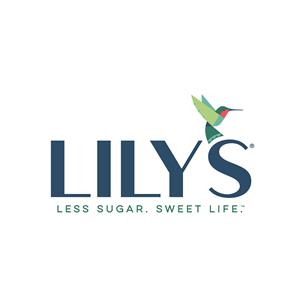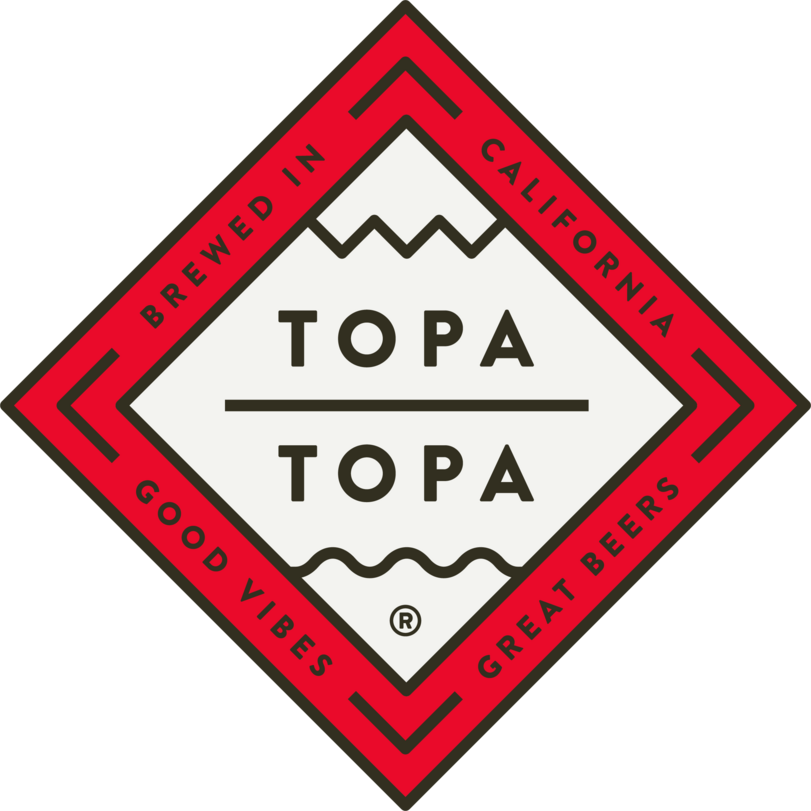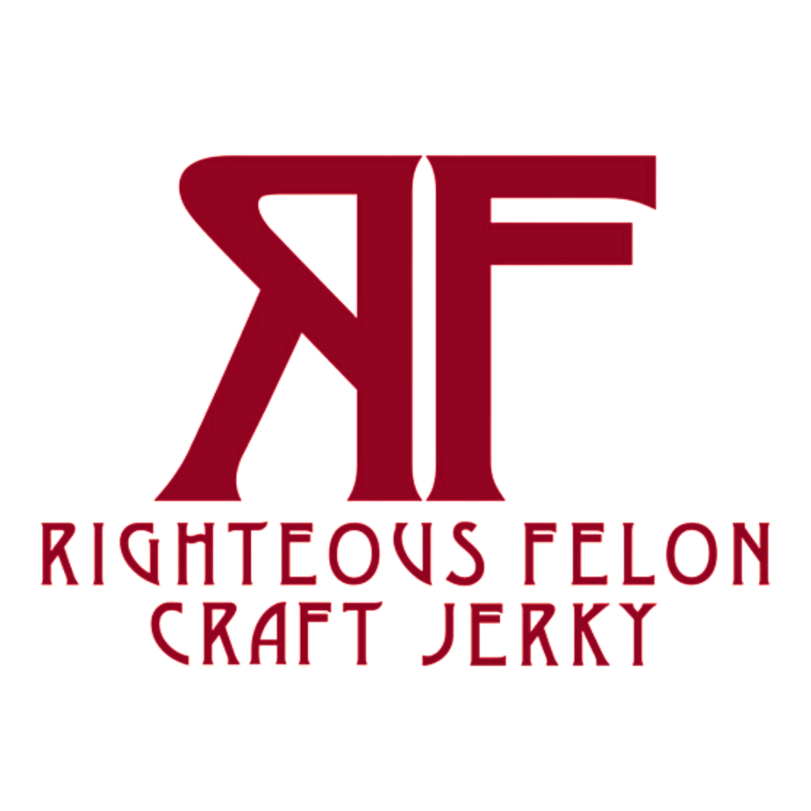Sweet Deal: Hershey’s Acquires Lily’s
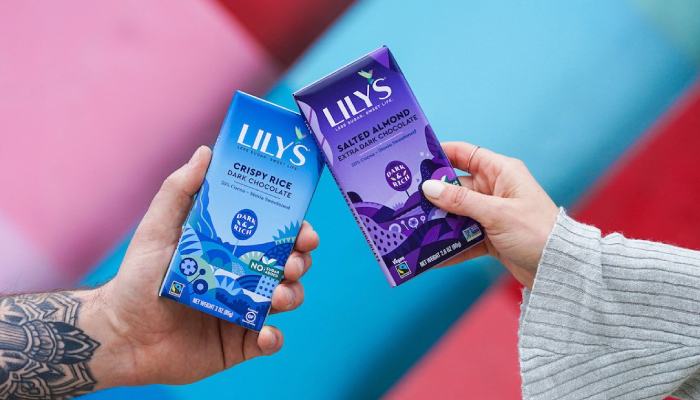
Low-sugar chocolate brand Lily’s is on track to join The Hershey Company. The candy and snack giant today announced its intention to close the deal for VMG-backed, Boulder-based Lily’s in the next 30 to 60 days.
Terms of the deal were not disclosed. Investment bank Houlihan Lokey represented Lily’s.
Launched in 2012 by Cynthia Tice, Lily’s debuted in Whole Foods Market with four different low-sugar chocolate bars. When VMG invested in the brand in 2018, the company had expanded to baking chips and had added several new bar SKUs, but only had four full time employees. At the time, according to a LinkedIn post by Houlihan Lokey VP Brandon Ng, the company had less than $30 million in sales.
Post investment, VMG brought in a skilled executive team, including CPG veteran Jane Miller as CEO along with CFO Lonna Borden (former CFO at Justin’s and Izze), SVP of Operations Phil Mason (formerly of Thanasi, Evol and Nestle), VP of Marketing Sarah Meis (former VP of marketing for Van’s Natural Foods and Purely Elizabeth) and SVP of sales Seth Monette (formerly of Cookie Chips, Interbake and General Mills). Lily’s also underwent a rebranding, with more modern, colorful packaging designed by Bex Brands.
Since then, the company has been on an innovation tear, with its bar offerings alone growing to 18 options across milk, dark and, recently launched, white chocolate bases. Lily’s also further built out its baking assortment, adding baking bars and flavored chips in varieties like butterscotch, mint, and salted caramel, and added snacking options such as chocolate covered nuts and popcorn. Not every launch was successful — with the low-sugar goal a difficult one to tackle — the brand’s nut butter cups had to be reformulated and relaunched and its low-sugar cookies are no longer available for sale on its website.
The deal will allow Hershey’s to strengthen its presence in baking as well as better-for-you (which the company refers to as BFY) confectionery, the company said in a release. The move comes after Hershey’s divested from its premium baking brands Scharffen Berger and Dagoba in 2020.
“Hershey is focused on developing a BFY confection portfolio that offers a variety of choices to meet the evolving needs of our consumers,” Chuck Raup, Hershey’s US president, said in the release. “Lily’s is a great strategic complement to our existing offerings in this growing segment of the confection category.”
Hershey’s also noted that it sees the BFY confection set as “under-developed.”
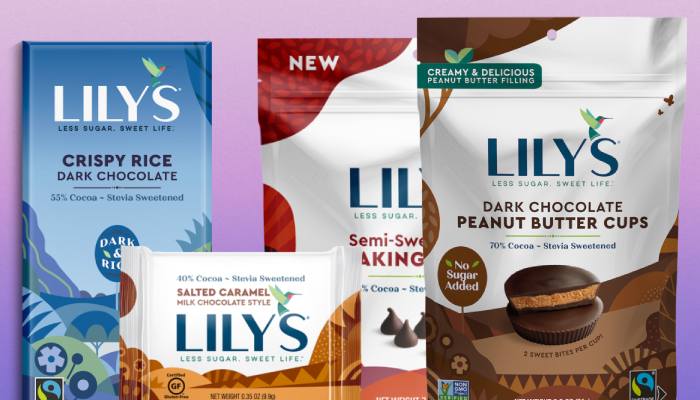
Still, there has been plenty of interest in the space by both consumers and investors alike. Most notably, in January of this year, Mondelez acquired chocolate and snacking brand Hu Products. Though Hu also aims for sugar-conscious consumers, it differs from Lily’s by using organic unrefined coconut sugar instead of Lily’s erythritol, stevia and inulin combination for sweetness. Meanwhile, on the sugar candy side, in October of last year TPG acquired gummy brand Smart Sweets, which uses allulose or erythritol in its product lines.
There have also been newer low-sugar entrants, including Mid-Day Squares, ChocXo and Skinny Dipped. Additionally established brands, such as Ghirardelli and Guittard, have also launched their own low-sugar options, while snacking brands including Perfect Snacks, High Key and Quest have tried to enter the BFY confection space as well.
The deal comes after Hershey’s revealed a new strategy for the BFY subsegment earlier this year. Calling out its history with “portion controlled choices” such as the Hershey’s Kiss, the company announced a five pronged approach including: offering more portion controlled treats, extending its core brands into BFY offerings, investing internally and externally in R&D opportunities in sugar reduction, looking to partnerships and licensing deals, and seeking new brands via M&A.
As evidence of this strategy, the company also disclosed its C7 Ventures had co-led a round of funding in Bonumose, Inc., a start-up company working with rare and natural sugars. The venture arm had previously also invested in upcycled cacao brand Blue Stripes Group.
Hershey’s has seen varying degrees of success via M&A as a tactic, particularly as it worked to move from confectionery into the broader snacking space. While Pirate’s Booty has been accretive for the company’s Amplify Snack Brands division, other brands have struggled. Last year Hershey’s sold meat snack brand KRAVE back to its original owners, Jon Sebastiani’s Sonoma Brands, after several years of lackluster performance. Meanwhile 2016 acquisition Bark Thins also has been moved to several different teams.
The company did not immediately disclose where and how Lily’s will be integrated into the larger Hershey’s platform — either under its traditional confectionery team or under Amplified. A press release by Hershey’s noted the company’s headquarters are “based today” in Boulder, Colorado — possibly alluding to a move or integration.
The confection category has had a rocky past year, with the Covid-19 pandemic reducing in-store impulse purchases and scuttling social gatherings such as Halloween, Easter, and Valentine’s Day celebrations. Still, according to research firm Mintel, there’s still plenty of hunger for reduced sugar options.
In a March report the firm noted that 23% of US consumers are concerned about added sweeteners in candy and confectionery, and one in five sugar confectionery eaters in the US have cut back on their consumption in the past year.
“The war on sugar will remain a challenging battleground as our research reveals that consumers overwhelmingly want to keep their usual chocolate products without sugar reduction,” the report noted, “In the year post-COVID, expect to see a divide among global chocolate consumers – those that take their health and wellness seriously, reducing or eliminating chocolate consumption, and those that prioritize the indulgence and comfort that chocolate can bring.”
